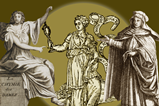How chemistry provides a unique perspective on causation

It is hard to overstate the importance of chemical reactions in understanding nature and sustaining life. From lighting fires and fermenting bread, to breathing, developing life-saving drugs and creating (but also tackling) climate change, there are very few activities that are not the result of naturally occurring or anthropogenic chemical reactions.
Yet philosophers have not examined reactions as much as other aspects of chemistry. In part, this is because of the implicit assumption that understanding the chemical and quantum mechanical properties of substances suffices to explain how they react. And indeed, this is sensible: the way reactants interact with each other is determined by the properties of their constituting elements.
Nevertheless, examining reactions prompts discussions around one of the most intriguing issues in philosophy: that of causation. Formally, causation refers to a spatiotemporal relation between a pair of events, entities or facts such that the first event presumably leads to the occurrence of the second event. One of the primary questions this raises is whether everything in the world has a cause for its occurrence. In this context, Plato claimed that ‘everything that becomes or changes must do so owing to some cause; for nothing can come to be without a cause’.1
Correlation or causation?
For a long time, philosophers believed that there is something in the nature of causes that intimately connects them with their effects. However, this changed with David Hume.2 He pointed out that one doesn’t actually empirically observe intimate connections between events, but merely the regular occurrence of them in pairs. There is no necessary connection between cause and effect – nothing in their very nature that requires the effect to follow its cause. Based on this, Bertrand Russell famously said that causation is ‘a relic of a bygone age, surviving, like the monarchy, only because it is erroneously supposed to do no harm’.3
But how does this relate to chemical reactions? Chemical reaction statements look very much like special cases of causal relations. Each statement identifies a relationship between two sets of substances, such that when the first set of substances occurs one expects the second set to follow. When, say, hydrogen molecules are put together with oxygen molecules under suitable thermodynamic conditions then the result is the production of water. Thinking of reactions as instances of causal relations reveals fascinating mysteries around causation and reactions alike.
For example, chemical and physical knowledge around reactions could be used to undermine Hume’s attitude towards causation. Being able to explain a reaction in detail in terms of the properties of its reactants could constitute empirical evidence of a substantive connection between cause and effect. In this instance, science could be said to offer an account of how the very nature of the causes (explained in terms of the reactants’ inner constitution) leads to the production of effects.
Catalysing conversations
Another mystery around reactions concerns what counts as a genuine cause and effect. The obvious answer seems to be that reactants cause their products. However, the presence of reactants is by no means sufficient to guarantee the formation of products. Appropriate thermodynamic conditions need to apply, and one may need to add a catalyst as well. Catalysts are particularly intriguing when considering causation. They are chemical substances that – when present – increase the rate of the reaction without modifying its overall standard Gibbs energy. Given this, their presence can be said to partly cause a reaction, even though they do not substantively participate in it (because they do not transform into products).
Furthermore, unlike classic examples of causal relations, a chemical reaction is not an event where chemical substances irreversibly transform into their products (like how a rock would irreversibly cause the shattering of a window). Instead, it is a dynamic process that – once it reaches equilibrium – results in a state of continuous transformation from reactants to products and vice versa. This is very interesting because it signifies the existence of causal loops; a major challenge for accounts of causation that require causes to occur at an earlier time than their effects.
Despite Russell’s wishes, talk of causation is pervasive in our everyday language. So much so, that we mostly overlook what empirical evidence we have for suggesting such a substantive relation in different aspects of our life. Chemistry – and chemical reactions in particular – provide a unique perspective through which we can further explore the extremely common, yet very mysterious, idea of causation.
References
1 Plato, Timaeus and Critias. Trans. D. Lee. Penguin Classics. Harmonsworth Middlesex: Penguin books Ltd, 1971
2 D Hume, An enquiry concerning human understanding: A critical edition (Vol. 3). Oxford University Press on Demand, 2000
3 B Russell, Proceedings of the Aristotelian society, 1912, 13, 1

















2 readers' comments